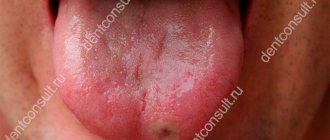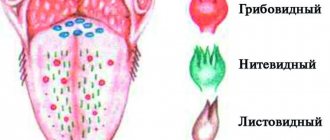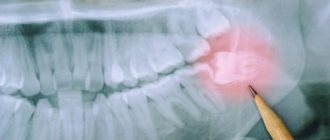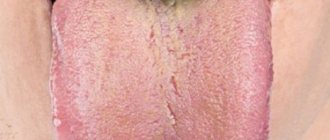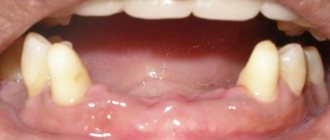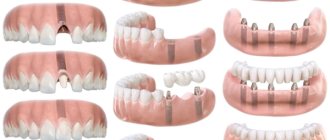- Published by: Laima Jansons
Loss of taste is a disease that is accompanied by disruption of the taste buds . It can be short-term - after eating too hot or cold food, or long-term, and this already signals problems with internal organs:
- ageusia is a pathological process accompanied by a complete loss of taste perception ;
- hypogeusia is a disease in which there is a partial loss of taste ;
- Dysgeusia is a pathology that is characterized by distortion of taste sensations and changes in perception.
Causes of complete loss of taste
The main factor in the complete loss of taste for sweetness or salt is long-term depressive and stressful conditions . Other ageusia factors include:
- infectious lesions of the nervous system pathways;
- inflammation of the lingual nerve or chorda tympani, accompanied by neuritis of the facial nerve;
- damage to the back of the tongue, which leads to neuritis of the glossopharyngeal nerve;
- pathologies of the medulla oblongata;
- inflammation of the vagus nerve.
This is interesting! In the human body there are significantly more bitter receptors than others. This is due to the fact that most toxic substances have a bitter and pungent taste.
Diseases in which there is a complete or partial loss of taste
- Neuritis of the facial nerve or inflammatory damage to the nerve that is responsible for facial muscles. In addition to loss of taste, the patient experiences weakening of the facial muscles and asymmetry . The patient cannot smile or frown, and the process of chewing food is difficult.
- Facial nerve paresis or paralysis is a pathology of the nervous system that occurs due to an infection of the upper respiratory tract. The pathology is accompanied by impaired taste perception and facial asymmetry .
- Acute viral hepatitis is an infectious lesion of the liver, as a result of which taste perception is impaired . The main symptoms of the disease are jaundice, diarrhea, vomiting and loss of appetite .
- Sjögren's syndrome is an autoimmune disorder that is accompanied by a decrease in secretion production from the salivary and lacrimal glands. Dryness in the nasopharynx, burning in the eyes and loss of taste are symptoms of this disease.
- ARVI - viral damage to the taste buds, damage to the nerve endings of the receptors responsible for taste, nasal congestion contribute to partial loss of taste . Normalization of taste perception is achieved after suppression of the virus in the body.
Complications of ignoring taste
Ignoring the problem leads to the development of various complications:
- There is a loss of appetite. It seems to a person that his favorite dishes have a strange, unusual taste, so he stops enjoying eating.
- Against the background of sluggish infections, a decrease in immunity occurs.
- If you delay visiting a doctor, the disease enters the chronic phase.
- Transfer of infection from the oral cavity to vital organs.
- Insomnia, aggression, developing against a background of discomfort, irritation from the constant salty taste.
- Atherosclerosis resulting from dehydration, a decrease in the elasticity of blood vessels.
Causes of partial loss of taste
Conventionally, the tongue can be divided into four parts, each of which is responsible for the perception of a certain taste.
Photo 1: The tip of the tongue is responsible for the sensation of sweet taste, the middle - for salty, the back of the tongue perceives bitter, and the edges of the tongue are responsible for sour sensations. Impaired perception is associated with various pathological processes in different parts of the tongue. Source: flickr (“R☼Wεnα”).
Sweet taste is lost
Loss of sweet taste can occur due to an inflammatory process at the tip of the tongue, a burn, or injury to this area. Disturbances in the papillae of the tongue, pathologies of nerve impulses to the brain are also factors in reducing the sensation of sweetness.
If you don't feel the salty taste
A weakening of the sensation of salty taste or its complete loss indicates injury to the middle part of the tongue. Bacterial and fungal infections (candidiasis) affect the tissues where taste buds are located .
Loss of salty taste perception is often caused by heavy smoking , which causes the taste buds to atrophy. Malignant neoplasms in the brain provoke ageusia or hypogeusia of salty taste, since the brain cannot recognize the incoming impulse.
Loss of sweet and salty taste
There are also several reasons that provoke the loss of sweet and salty taste at the same time:
- pathologies of the thyroid gland;
- long-term use of broad-spectrum antibiotics, antihistamines, anticonvulsants;
- hypovitaminosis (especially vitamin B12);
- lack of zinc in the body.
Partial loss of taste (sweet or salty) is often noted in patients suffering from epileptic seizures . Also common factors of hypogeusia are:
- changes in the deep parts of the temporal lobe of the brain, which is accompanied by mental disorders and schizophrenia;
- neuritis of the fifth or seventh pair of cranial nerves;
- damage to the brain stem.
Eating disorder
Malnutrition is one of the reasons that can lead to a number of serious diseases that affect the functioning of the entire body. Symptoms can be extremely varied, and the appearance of a taste in the mouth is no exception. One study showed that nutritional deficiency is one of the causes of gum disease and multiple forms of caries.
Patients who adhere to certain dietary principles, such as veganism, vegetarianism, or following strict diets, may suffer from such symptoms. Using laboratory blood tests, the doctor will help determine what substances and vitamins are missing and give appropriate recommendations.
Proper nutrition can be considered as a factor in preventing various problems and maintaining normal functioning of the body. The doctor can give appropriate recommendations, for example, prescribe nutritional supplements and multivitamins.
Read also: Why is one eye larger than the other?
How to treat loss of taste
To quickly restore your sense of taste, you should consult a specialist to diagnose the cause of the disease. Depending on the factor contributing to the loss of taste, appropriate treatment is prescribed:
- Dryness in the mouth, accompanied by insufficient secretion of saliva, will be eliminated by drugs that help moisturize the oral mucosa. For this purpose, artificial saliva preparations are prescribed - Salivart, Mouth Kote.
- In addition to medications, you can use mouth rinses . They not only moisturize the mucous membrane, but also have an antibacterial effect.
- If the loss of taste is associated with fungal infections of the mouth , drugs for candidiasis are prescribed - Clotrimazole solution, Decamine ointment.
- When diagnosing a lack of Zinc and vitamin B12 in the body, Zincteral, Berocca, and intramuscular injections of cyanocobalamin are prescribed. Additionally, multivitamin complexes may be prescribed.
- restore taste perception . The leaves of peppermint, lemon balm and motherwort have a sedative effect and eliminate the main cause of pathology - neurosis. When the oral cavity is infected with a bacterial or fungal nature, rinses made from chamomile flowers, calendula and oak bark are used.
- To increase the spiciness, you need to add spices to your food such as cloves, cinnamon, mustard and lemon.
Photo 2: Regular cleaning of the surface of the tongue reduces the risk of loss of taste. Source: flickr (Gabriella Yazickr).
Diagnosis of taste disorders in children
If you suspect a taste disorder, you should contact a specialist. Parents should be alerted by the refusal of familiar and favorite foods, and at a more conscious age, by the child’s complaints. Also, the baby may begin to eat things that are not intended for this (it should be noted that at a certain age children “put everything in their mouths” in order to explore the world around them, and this is absolutely normal).
Diagnosing taste disorders in preschool children is quite difficult, since children cannot always clearly describe their sensations. During the examination, the corresponding side of the tongue is moistened alternately with a sweet, sour and bitter solution using pipettes. After each session, rinse your mouth thoroughly. In infants, the doctor pays attention to the general motor and facial reaction. Children over two years old can most often consciously talk about their feelings. Source: E.V. Pavlovskaya Selective appetite in children // Issues of modern pediatrics / 2013/ Volume 12/ No. 6
Homeopathic treatment for loss of taste
Homeopathic treatment differs from traditional treatment by increased efficiency and minimal negative impact on the human body . The homeopathic doctor individually selects the name of the drug, dosage and method of use.
| Drugs | Purpose | Additional symptoms |
| Hepar sulfur | Returns taste sensations. | Nasal discharge (including putrefactive discharge), sneezing. |
| Hyoscyamus | Lack of taste due to paralysis. | Accompanied by nervous exhaustion, increased weakness, and thirst. |
| Sepia | With a complete absence of taste and smell. | The patient is not comfortable in a warm room, there is increased dryness of the mucous membranes, and a herpes rash around the nose. |
| Silicea | In the absence of smell and taste. | Abscess, itching on the tip of the nose, weakened immunity, pale skin tone. |
Symptoms of dehydration
Dehydration can cause a number of symptoms, one of which is dry mouth. Due to a lack of fluid, saliva becomes more viscous and rich in minerals, which is what causes a taste in the mouth.
It is worth remembering that this is not the only sign. The following symptoms are typical for dehydration:
- fatigue, decreased performance;
- dizziness;
- change in urine: color, quantity;
- decreased number of urinations;
- strong thirst.
Dehydration can be caused by food poisoning, accompanied by prolonged diarrhea and repeated vomiting, alcohol abuse, excessive exercise and a number of other diseases and conditions.
The reason is tears
Another interesting reason may be related to the pathology of the tear ducts. It would seem, how are the eyes and the salty taste in the mouth connected? In fact, if there is a disruption in the functioning of the tear ducts, increased secretion of tears may occur; on the other hand, the normal passage of this tear content is also disrupted. As a result, the tear enters the nose, then it flows down the back wall of the throat, and a feeling of saltiness occurs in the mouth. Pathology of the lacrimal glands (ducts) can provoke a salty taste in the mouth.
Why does a metallic taste appear in the mouth? More details
Reason: ENT diseases
The salty taste sometimes has rather trivial causes: for example, bacterial sinusitis, allergic rhinitis, tonsillitis, pharyngitis, sinusitis or a cold. During inflammation, mucus appears in the sinuses, which consists of mucin protein, salt, nucleic acids and water. In the acute course of the disease, snot flows down the walls of the nasopharynx into the throat, and accordingly, a feeling of salt occurs. With sluggish inflammation of the ENT organs, mucus is also constantly disturbing by its appearance in the mouth.
ENT diseases also contribute to the appearance of a salty taste
Oral hygiene
A common cause of a salty taste in the mouth is poor oral hygiene. If a person does not brush his teeth well enough, if plaque forms, all this contributes to the development of pathological microflora, the waste products of which will give this unpleasant salty taste.
Also, the appearance of taste is influenced by the presence of an infectious process in the oral cavity - the formation of tartar, fistulas, chronic tonsillitis.
Taste of illness. How to determine your diagnosis by the taste in your mouth Read more
Salty taste in mouth
This is the first sign of dehydration. When a person drinks little water or takes diuretics, the fluid in the body thickens. It’s the same with saliva – salty sodium chloride accumulates in it. Or maybe you're just eating too much salty food - chips, crackers, salty sticks?
If the problem is related to dehydration, drink at least 1.5-2 liters of clean water per day, and in the heat - another 1 liter. At the same time, give up alcohol, including beer. Avoid drinking coffee, tea, energy drinks and weight loss shakes. All of these drinks have diuretic properties.
Very often, a salty taste occurs when the salivary glands are blocked. Then you will need to visit a dentist.
A salty taste in the mouth is a sign of dehydration.
Sour-salty taste
This symptom may be a warning of chronic or acute kidney failure, a condition in which the kidneys do not work properly and the body cannot eliminate toxins from the body. In severe cases of renal failure, a taste appears and the smell of the mouth changes. You may smell urine.
In addition to these symptoms, weakness, weight loss, loss of appetite, nausea and vomiting warn of the development of chronic renal failure and irreversible damage to the body. The person becomes drowsy, headaches and muscle pain occur.
Chronic renal failure
A urologist can diagnose kidney failure. To do this, you will need to take blood and urine tests and examine your kidneys. In some cases, you even need to do a biopsy.
Hydrogen sulfide taste
Such an unpleasant taste, like the taste of a rotten egg, suggests the presence of gastritis or a peptic ulcer caused by Helicobacter in your stomach, which can be detected by probing.
This can also signal stagnation of food in the stomach and the process of fermentation and rotting. Another taste of hydrogen sulfide may indicate a narrowing of the outlet of the stomach in the event of post-ulcer scars and tumors.
Therefore, in isolated cases, you can take an enzyme tablet to improve the digestion process, but in case of repeated signals, you cannot do without a doctor. And the sooner you meet him, the better.
Diseases of the nervous system and blood vessels
In rare cases, the appearance of a salty taste in the mouth can be caused by disturbances in the functioning of the nervous system and blood circulation, namely:
- cerebral ischemia;
- epilepsy;
- vascular atherosclerosis;
- thrombosis;
- high blood pressure;
- hemorrhagic stroke.
The development of a benign or malignant tumor in the brain or near nerve endings and roots often leads to disruption of the sense of touch and taste buds, which can result in an unusual taste in the mouth. Only a doctor can identify the exact cause through an extensive examination of the patient’s body.
Infections
Caries, gingivitis - each such infection without proper treatment can progress and lead to serious complications and consequences that affect many organs and systems.
With serious gum diseases such as periodontitis, patients are concerned about the following symptoms:
- tooth mobility;
- the formation of pathological gum pockets and purulent discharge from them;
- pain, burning and other unpleasant sensations in the gums;
- persistent bad breath;
- formation of massive dental plaque.
A fungal infection, which is characterized by the appearance of a white cheesy coating on the mucous membrane, can also provoke a salty taste in the mouth. With moderate and severe infection, patients may complain of a change in the taste of their usual food and the appearance of off-flavors.
HPV, the human papillomavirus, can infect the mouth and cause a strange taste in the mouth. If the diagnosis was not carried out on time and there is no treatment, this can cause a metallic and salty taste in the mouth.
Diagnosis and treatment of salty taste in the mouth
The development of prolonged saltiness in the mouth requires contacting a doctor. Remember that this symptom can be either a consequence of eating over-salted foods or a symptom of serious diseases.
To identify the cause of salinity in the mouth, the doctor collects an anamnesis, examines the patient, and prescribes a series of tests and examinations. Depending on the examination results, the patient is prescribed adequate treatment if necessary.
| Cause of salty taste in mouth | Treatment |
| Diseases of teeth and gums | Consultation with a dentist, sanitation of carious cavities, strengthening of gums with physiotherapeutic procedures and herbal medicine |
| Diseases of the nasopharynx | Rinsing the nose with saline sodium chloride solution, instilling vasoconstrictor nasal drops, therapy with antiviral agents. For diseases of the tonsils, gargling, the use of local antiseptics and absorbable tablets are prescribed |
| Upper respiratory tract diseases | Ambroxol-based expectorants, drinking plenty of fluids, chest massage during the recovery process |
| Diseases of the nervous system and blood vessels | Drugs that improve blood circulation in the brain, antipsychotics, injections of B vitamins, fibrinolytics if necessary |
The prognosis is generally favorable, but only if the patient does not self-medicate or ignore symptoms, but immediately consults a doctor
